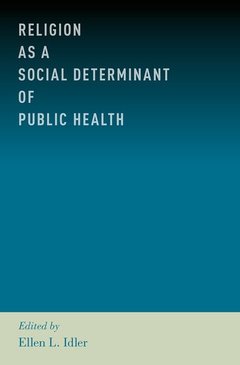Description
Religion as a Social Determinant of Public Health
Coordinator: Idler Ellen L.
Language: English
Subjects for Religion as a Social Determinant of Public Health:
Religion as a Social Determinant of Public Health
Publication date: 10-2014
Support: Print on demand
Publication date: 10-2014
Support: Print on demand
Religion as a Social Determinant of Public Health
Publication date: 10-2014
Support: Print on demand
Publication date: 10-2014
Support: Print on demand
Description
/li>Biography
/li>
Frequently in partnership, but sometimes at odds, religious institutions and public health institutions work to improve the well-being of their communities. There is an increasing awareness among public health professionals and the general public that the social conditions of poverty, lack of education, income inequality, poor working conditions, or experiences of discrimination play a dominant role in determining health status. But this broad view of the social determinants of health has, until now, largely ignored the role of religious practices and institutions in shaping the life conditions of billions around the globe. In Religion as a Social Determinant of Public Health, leading scholars in the social sciences, public health, and religion address this omission by examining the embodied sacred practices of the world's religions, the history of alignment and tension between religious and public health institutions, the research on the health impact of religious practice throughout the life course, and the role of religious institutions in health and development efforts around the globe. In addition, the volume explores religion's role in the ongoing epidemics of HIV/AIDS and Alzheimer's disease, as well as preparations for an influenza pandemic. Together, these essays help complete the picture of the social determinants of health by including religion, which has until now been an invisible determinant. Some health-determining influence flows through people's participation in religious practices and affiliation with mosques, synagogues, and churches. Some of it flows through lifestyle factors associated with religious observance. Some comes from relationships between religious institutions and institutions of public health and medical care. Some comes from the role religious institutions play in their communities, and in providing help for those in need and leveraging social capital. A groundbreaking work, Religion as a Social Determinant of Public Health explores the complex, multifaceted role of faith traditions and public health in throughout history, today, in in the future.
Ellen Idler, Director of the Religion and Public Health Collaborative at Emory University, is Samuel Candler Dobbs Professor of Sociology, and holds a joint appointment in Epidemiology in the Rollins School of Public Health. She is a Fellow of the Gerontological Society of America, and the author of Cohesiveness and Coherence: Religion and the Health of the Elderly and The Hidden Health Care System.
© 2024 LAVOISIER S.A.S.
These books may interest you

Religious Responses to HIV and AIDS 105.47 €



